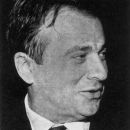8th International Henryk Wieniawski Violin Competition
Poznań, 10-25 October 1981
Watch a documentary about the competition:
It was yet another stroke of luck that decided the further course of the Wieniawski Competitions. In the typical five-year cycle, the eighth edition of the event was scheduled for 1982. Meanwhile, an idea germinated with organizers of the two international competitions held in Poland at the time, to shorten the break between the events, as a period of five years was considered excessively long. The provident inhabitants of Poznań were quick to pick up the idea and announce the date of subsequent rivalry for the Wieniawski’s laurels as early as two years in advance: October 1981. As we were soon to find out, it was not a very good time for this sort of assemblies. Half of the country either already was on strike, had just announced industrial action, or was about to do so. Save for vinegar, shops were empty. Enlivened with the foundation of the “Solidarity” movement in August 1980, it was only the nation’s spirit that still persisted. The competition organizers relied on it very much, and indeed, it helped them overcome countless obstacles. The list of duties so thoroughly practised in previous years, this time was appended with completely new ones. The candidates, jurors and guests were to be granted not only ample, but also peaceful living conditions. Musicians of the orchestra were to be provided with… extra meat rations, while staff members needed extra petrol coupons...
However, when the competition machine was set in motion, music and artistry of the young musicians quickly diverted attention from everyday problems. The very opening proved a genuine feast. With his phenomenal performance of Bach’s and Beethoven’s Concertos Henryk Szeryng ushered in a truly festive mood. Besieged by journalists, he would very readily talk about his Polish roots (and the unchanged spelling of his name to prove it), as well as his not giving in to opinions of those who tried to discourage him from going to the crisis-ridden country. And later, for two more weeks, he was excellently able to control the multilingual group of jurors (which, for the first time, featured Wanda Wiłkomirska and Konstanty A. Kulka). In French, English, German, and, naturally, Polish, he would appeal, explain, and persuade to evaluate the performance of the young musicians in the fairest and most objective way. On stage, things were dominated by the Japanese. As many as five of them managed to surmount the difficulties of the first two stages. They did not complain when light in the hotel suddenly went out, or when cold nagged in the auditorium (in particular, in its back rooms), because the boiler house had run short of fuel. All of them reached the final stage and took five of the six prizes. It was only the bronze medal that fell into the hands of a musician from Europe (a Pole!).
Unfortunately, other developments soon overshadowed the interest generated by this particular competition. One week later the Polish Parliament adopted a resolution on “maintaining peace and order”. Six weeks later martial law was declared in the country. It was to remain in force for the entire year to follow. In October 1982, the original date of the 8th Wieniawski Competition, when a new Trade Union Act delegalized “Solidarity”, genuine social disorder spread through the streets of most Polish towns. Even the most beautiful music or most excellent virtuosos would not have been able to contain it. The next edition of the violin feast was to be held again after a five-year break.
source: R. Połczyński, Da Capo. 75 lat Międzynarodowych Konkursów im. Henryka Wieniawskiego
Read more about the 8th Competition (PDF, 1.15 MB) >

A poster of 8th edition of Wieniawski Violin Competition designed by W. Schmidt.
JURY MEMBERS
Chairman: Henryk Szeryng (Mexico)
Varujan Cozighian (Roumunia)
André Gertler (Belgium)
Jadwiga Kaliszewska (Poland)
Emil Kamilarov (Bulgaria)
Oleh Krysa (USSR)
Konstanty Andrzej Kulka (Poland)
Wolfgang Marschner (RFN)
Yfrah Neaman (Great Britain)
Gerard Poulet (France)
Max Rostal (Switzerland)
Manfred Scherzer (GDR)
Zbigniew Szlezer (Poland)
Roman Totenberg (USA)
Yoshio Unno (Japan)
Wanda Wiłkomirska (Poland)
PRIZE WINNERS
1st prize: Keiko URUSHIHARA (Japan)
2nd prize: Elisa KAWAGUTI (Japan)
3rd prize: Aureli BŁASZCZOK (Poland)
4th prize: Seiji KAGEYAMA (Japan)
5th prize: Iwao FURUSAWA (Japan)
6th prize: Megumi SHIMANE (Japan)
Awards: Lenuta Atanasiu-Ciulei (Romania); Bartosz Bryła (Poland); Lothar Strauss (GDR); Magdalena Suchecka (Poland)


















